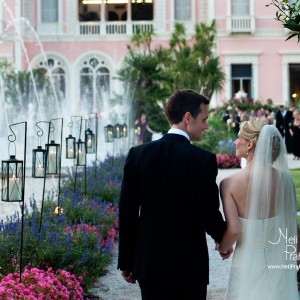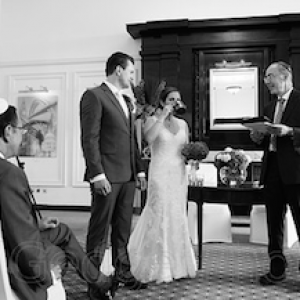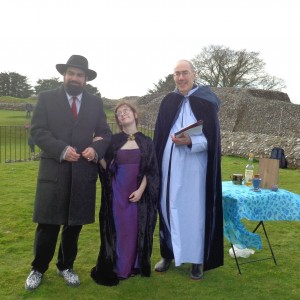
by Michael | Apr 19, 2016 | Blog
Holding a destination wedding can be really exciting and exotic. Flying off to a romantic spot, getting wed, bathed in warm sunlight, surrounded by your nearest and dearest, certainly takes some beating.
Do start the booking process early. The venue may fill up sooner than you’d think. Be aware also that there may be different legal requirements where you are going, which may take time to sort out. (And make sure your passports are up-to-date!)
Do plenty of research – it might pay to use a wedding planner, either in this country or in the resort you are choosing, to supply the information you may need.

Money
Set your budget (and keep to it!). Who is paying? Do you pay for the accommodation and flights for your guests, or must they? Get everything in writing, and don’t pay for anything up-front, if you have doubts about it.
Tickets
Brides, don’t forget to book airline tickets in your maiden name (unless you are legally changing your name before you marry). It can sometimes be worth dropping into the conversation that you are off to your wedding. You may just receive some lovely little freebies on the day.
Clothing
A wedding-gown can be taken onto the plane as carry-on luggage (don’t wear it for the flight!). Your wedding shop ought to be able to pack it up for you.
Bear in mind that a heavy train may not be ideal, especially if you’re getting married on a beach. Flat shoes or sandals will be the best bet for a beach wedding. You also need to consider the fabric (eg chiffon or silk) of the dress, if you’re easily affected by heat.
Arrival
It is worth arriving early, before your guests, so you can have a rest and acclimatise. Arriving early gives you the chance to sort out certain details at the venue.
Ceremonies
Although venues may have their own celebrants on site (or access to some), increasingly, people prefer to know who they’re dealing with. You don’t want your wedding ceremony conducted by somebody who may not like or trust!
Consequently, some couples are bringing their own civil celebrants out from the UK with them. It may add surprisingly little to the costs you have already committed to, especially if you are making block bookings through a travel agent.
To ensure that your dreams turn into reality, so that the ceremony is just as you want it, do contact Vows That Wow, and let Michael look after your big day for you.

by Michael | Apr 12, 2016 | Blog
As a civil celebrant, I note that mixed marriage has become increasingly common nowadays. It may be between couples whose beliefs encompass different strands of the same religion (eg Anglican and Roman Catholic) or believers of totally different faiths (I was recently honoured to be asked to perform a ceremony for a Jewess marrying a Muslim).

Source: Philippa Gedge photography
And then there are even less conventional combinations (in the picture below, I conducted a pagan handfasting, incorporating a number of Jewish elements).

Problems
On one occasion, I had been booked to conduct a ceremony for a practising (Reform) Jew and a practising Anglican. I was to be working together with a Reverend to create the appropriate service for the pair. Unfortunately, one set of grandparents were strict Jews and threatened to boycott the ceremony, unless an ordained rabbi (which I am not) led that part of the wedding.
It was certainly a dilemma for the couple.
Decisions
Who was in the right? Should the couple not be allowed to do what they want and believe in? Especially on their big day. Or should they respect and please family?
Of course, there is no doubt what my feelings about the matter are. However, there are two sides to any argument.
On the one hand …
As both of them actively follow their own religion, they do need to seriously consider how they will bring up any eventual children up. Circumcision may be just one of the decisions they will have to agree on. What about religion school, if any?
Once they have dealt with such problems, there are still those grandparents to contend with. The pair won’t choose to offend them, naturally. They should show respect. But whose wishes should actually prevail?
… on the other
Surely this has got to be the couple’s (joint) decision? They are adults and It is their lives, after all. They certainly won’t want to be insincere and uncomfortable on arguably the biggest day of their lives.
If reasoning with objectors doesn’t work, it might be possible to compromise (though difficult to do in this circumstance) or make it up with them in some way. Maybe invite them to participate or assure them that you will spend festivals like Passover together with them, and that you want them to play a full part in the life of any offspring.
It may even be that the ceremony is so sincere and beautiful that the objectors come round of their own accord.
Wouldn’t that be something?
Please contact me for a (non-obligation) chat, if you are contemplating a mixed marriage (or if anyone you know is) .
by Michael | Apr 5, 2016 | Blog
People tend to marry later than they used to. There are many reasons for this, but, come what may, the bride and groom are likely to be more mature nowadays.
Reasons for marrying later
Quite often, late marriage is for financial or career reasons. Maybe the couple want to put off having a family. Or, of course, either or both may be divorcees or widows/widowers, returning for another stab. Other people believe they shouldn’t marry until they are ‘sure’ that the relationship has a good chance of lasting or they simply lack confidence.
Gay couples in a civil partnership are increasingly looking to convert their legal status to marriage, and many established pairs are therefore taking advantage.
Things to remember
There will obviously be no basic difference between a wedding for youngsters and one for oldsters.
For a full religious ceremony (provided it’s permitted), you have the usual options of church/synagogue, etc., and for a secular ceremony there is the register office (which guarantees the compulsory legal words).
For a less standard – personalised – ceremony (that would be additional to the registrars’ service), you have the option of a civil ceremony.
Civil Ceremony suggestions
The beauty of civil ceremonies is that you can incorporate elements of your choice that reflect your personalities and beliefs, so each service will be unique.
That means that there are no ‘hard and fast’ rules; merely, suggestions. However, as with all my clients, I would expect to have a preliminary discovery conversation. Assuming we feel happy to work together, I send over drafts for approval.
The service
The areas I am likely to cover include music, rituals and readings.
- There is no reason why older couples can’t enjoy the same sort of music as youngsters (if that’s their choice). They may choose the same rituals (a Unity Candle is always lovely – but older pairs may have families they want to involve, so this ritual can be expanded to include offspring etc.). Either age group may decide to include the offering of a gift, such as a red rose, to their parents during the ceremony.
A good celebrant ought be able to supply suitable suggestions.
Of course, some rituals (such as ‘jumping the broom’) may be less advisable for more mature couples!
- There’s no reason why age should prevent couples from writing and/or reciting their vows or having the rings blessed.
- Readings can (should!) fit in with the couple’s desires, and many are not age-specific in any way. However, some are suitable for more mature couples.
One thing is for sure: a wedding for the more mature may be every bit as beautiful and meaningful as one for a young couple – sometimes, even more so!
If you are looking for guidance and help, then please feel free to arrange a complimentary chat with me.
by Michael | Mar 29, 2016 | Blog
At my last handfasting wedding, I was delighted by the guests’ reaction to the ritual. Of course, I had explained what it was all about, but the warmth and spirituality of the occasion obviously was a great success.
However, most people don’t know what a handfasting is. I therefore hope it will be helpful if I say a few words about it. It forms a central part in pagan ceremonies, but is often chosen as an “add-on” in a traditional wedding.
It may be something you yourself would like to consider.
History
Handfastings began as a marriage rite in the Middle Ages. When peasants married, they might have been unable to afford a clergyman’s fee to hear their vows or, indeed, a ring to signify their love. The ritual of handfasting became a popular alternative.
A cord was wrapped round the wrists of the couple and left on them until their union was consummated. It would usually be kept as a tangible reminder and proof of their commitment and love.
It has given us the expression “tying the knot”.
Present-day Ceremony
Nowadays, the cord symbolises the pair’s commitment and mutual love. Here’s a suggested order of service that may include a handfasting, although it will, of course, be different for a full pagan ceremony.
- Walking down the aisle, to be given away by the father
- Officiant welcome
- Meaning of love (possibly from a religious slant, if that’s wanted)
- Here, or after the Handfasting, or at both times, a song or a reading/poem
- Handfasting
- Possibly, a Unity Candle or Sand Ceremony or Chalice ritual
- Exchange of Rings/Vows
- Jumping the Broom (not actually pagan, but deriving from wedding ceremonies conducted by slaves in the American South), now used to symbolise sweeping in the new as a new home is created
- Concluding words
Details would be up for discussion, but that might be a starting draft.
Thoughts
Possibly my favourite handfasting was part-pagan, part-Jewish with rituals from both sides. For this ceremony too, I explained the symbolism for those unfamiliar with the other’s practices, so everyone could understand and feel included.
It was a totally unique occasion – absolutely perfect for the couple and – clearly – for the guests too.
If you want to add extra sparkle and personality to your big day, you could do worse than try a handfasting. Your civil celebrant will be only too pleased to tell you more.
by Michael | Mar 22, 2016 | Blog
Like it or not, social media is here to stay. It will surely be a part of your wedding, so a few tips about prudent use might prove invaluable.
Let’s consider three areas: wedding websites, invitations and handling social media.
Wedding Websites
It is increasingly common for couples to use wedding websites, Facebook pages and/or designated hashtags. The website should give directions to the venue (especially for more remote locations) and information about attire. Will it be outdoors? What sort of terrain should guests expect? If dress is important to you, don’t assume that everybody is going to know your expectations.
If you want to share details about your ‘story’, that is fine, but don’t go over the top. Make them tasteful and sincere.
Invitations
Obviously, you are going to include essentials such as date, time and place.
You may also have particular feelings about whether or not your wedding will be child-friendly or not. It may be better to approach this via the website, as you will have space to explain/justify your requests.
You don’t want to cause unintentional offence by excluding someone’s child while including somebody else’s. However, if that latter child has been invited as a bridesmaid, that’s not so bad. Or if you feel obliged to limit children to, say, ten for budgetary reasons, you could explain this. (Fore-warned is fore-armed!) Of course, you may at least still be able to invite the whole family to the wedding ceremony only.
Do read my article on children at weddings for more discussion on this subject.
If accommodation for guests is going to be an issue, your website can offer options and information.
A website is good for telling people about gifts, including whether there is a wedding list etc., not least because it can be updated. (However, information can go on a standard invitation too.)
Handling social media
Make sure you leave no doubt about social media rules. In my role as civil celebrant, I am increasingly seeing signs in the venue as people come in, informing them of the couple’s wishes – eg “Unplugged Ceremony”.
Let people know if they should not post photos of the big day until you have done so. This may apply especially to pictures of the bride before she’s walked down the aisle, so specify your wishes.
A hashtag is one way to track wedding photos from guests, so make sure you give out the information as to which hashtag your wedding will be using.
If you’re inviting a lot of VIPs, it may be better to request social media silence from your guests.
As a guest, if you’re not happy about something that happened (or didn’t) at the wedding, don’t put that on social media. The couple probably put a lot of effort in to planning the event, and, with the best will in the world, things can get overlooked or go wrong. (At my wedding, I genuinely forgot to invite an aunt to the family supper afterwards, and that understandably didn’t go down well, although relations were restored after a while!)
Social media and the internet should add to the experience, not cause stress or detract from the couple. Be careful and respectful.
by Michael | Mar 15, 2016 | Blog
So what do I know about Best Man speeches? I have given just one in my life, though it proved to be an absolute hoot. It was about twenty years ago now.
As a professional civil celebrant, I often have to help couples write their vows. Wedding speeches, though not actually part of my remit, are a natural extension of this. After all, this falls under the banner of public speaking, which is necessarily one of my areas of expertise.
So I make no apology for confronting this subject. It’s an important one, as so many people are genuinely intimidated by the thought of public speaking. There’s a lot of help on offer about public speaking (you may like to see my blog on this subject), but if you know you have a good speech to give, delivery becomes that bit easier.
How you actually deliver your speech is important, and, again, my blog has sound advice, which needs to be noted, especially for the amateur public speaker. One word of caution from the article that really bears repeating is not to let yourself get sozzled, however nervous you might be!
As for the content, here are some suggestions:
- It’s always good to get people laughing (for the right reasons!), so if you can find a good tag or joke (and tell it well), you’ll be off to a great start.
- Make sure your humorous remarks are in good taste – religion, politics, families, insults are all dangerous areas. Your main subject should be the groom. You’ll want to tell a few stories about him (you can get information from others, but, essentially, this should be about you and your best friend). Try not to waffle or talk too much about people the bride’s family will know nothing about.
- It’s worth mentioning how you first met the groom and why he chose you for the honour. Without being too cruel (it is the groom’s big day, after all), take the mickey out of him! Humour (with empathy) is key.
- Although much of your speech should be humorous, make sure it is personal and real. There should be a serious element too. You are his best mate, so a few sincere compliments are absolutely appropriate. You should acknowledge how honoured you are.
- Mentioning how happy the groom is now and how happy for him you are is important, and even moving. You can address these words directly to the groom for greater effect. You might even be overcome with emotion for a moment, and that is nothing to be ashamed of!
- You will want to finish off presently, preferably with a laugh or two. A suggestion could be fake telegrams. If there are real ones, start with these, but then move on to a couple from, say, the groom’s hamster or from Prince Charles or a TV star.
- This whole speech should normally last between 5 and 10 minutes. You conclude (traditionally) with a toast. This can be funny, if you can manage it.
I accept that writing a speech will take some effort and sweat of the brow, but it is manageable, especially if you can make use of this advice. The rewards are enormous for all concerned, so the labour will be more than worthwhile.




